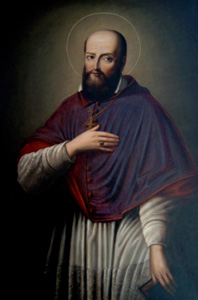 I first came across St Francis de Sales in a course at Whitley that looked at a whole bunch of devotional writings that have stood the test of time. Actually that’s not entirely true: I had clearly come across his legacy every time I drove past Salesian College; though I would never have known it. I always assumed Salesians were the people from a tiny, probably now-defunct Balkans country. Anyway, among the devotional texts from my course was Francis de Sales’ ‘Introduction to the Devout Life’. It’s amazing, and I’d recommend you read it if you get the chance.
I first came across St Francis de Sales in a course at Whitley that looked at a whole bunch of devotional writings that have stood the test of time. Actually that’s not entirely true: I had clearly come across his legacy every time I drove past Salesian College; though I would never have known it. I always assumed Salesians were the people from a tiny, probably now-defunct Balkans country. Anyway, among the devotional texts from my course was Francis de Sales’ ‘Introduction to the Devout Life’. It’s amazing, and I’d recommend you read it if you get the chance.So here’s to St Francis de Sales.
From Wikipedia:
Francis de Sales was born into a noble family. He was the first of twelve children, and as such enjoyed an education in La Roche and Annecy; His father only wanting him to attend the best schools. In 1578 at the age of 12 he went to the Collège de Clermont in Paris. A year later Francis was engulfed in a personal crisis when after attending a theological discussion about predestination became convinced that he was damned to hell. In December 1586 his despair was so great that he was physically ill and even bed ridden for a time. In January 1587 he visited the Church Saint-Etienne des Gres with great difficulty. There his crisis ended, and he decided to dedicate his life to God. Francis came to the conclusion that whatever God had in store for him was good, because God is love. This faithful devotion to the God of love not only expelled his doubts, but also influenced the rest of his life and his teachings.
In 1588 Francis transferred from Paris to the University of Padua where he studied both law and Theology. At the University he made up his mind about becoming a priest. In 1592 he ended his studies with the promotion to doctor certified in both law and theology. Then he made the pilgrimage to Loreto before going home. At home his father had already secured a variety of positions for his son, one of which was a position on the Senate of Chambéry. It was difficult for Francis' father to accept that his son had already chosen another career.
After studying the humanities, rhetoric, theology, and law at La Roche, Annecy, Paris, and Padua, he famously refused to marry the wealthy heiress his father had chosen as his bride, preferring a clerical career. The intervention of Claude de Granier, then bishop of Geneva, won him ordination and appointment as provost of the cathedral chapter of Geneva in 1593.
Since the Reformation, the seat of the bishops of Geneva had been located at Annecy in Savoy, due to Calvinist control of Geneva itself. Francis, in his capacity as provost, engaged in enthusiastic campaigns of evangelism among the Protestants of Savoy, winning many returns to the Old Faith. He also traveled to Rome and Paris, where he forged alliances with Pope Clement VIII and the French King Henry IV.
In 1602, Bishop Granier died, and Francis was consecrated bishop of Geneva himself. During his years as bishop, he garnished a reputation as a spellbinding preacher and something of an ascetic; in particular, he was known as a friend of the poor, a man of almost supernatural affability and understanding. These last qualities come through wonderfully in his famous books. He died on 28 December 1622 in Lyon, while he travelled in the entourage of Charles Emmanuel I, Duke of Savoy.
Francis of Sales was beatified in 1661 by Pope Alexander VII, who then canonized him in 1665. His feast day is January 24. In 1877, Pope Pius IX declared him a doctor of the Universal Church.
In 1923 Pope Pius XI proclaimed him a patron of writers and journalists, because of the books he wrote, the most famous of which was Introduction à la vie dévote ("Introduction to the Devout Life"). He also left the mystical Traité de l' Amour de Dieu ("Treatise on the Love of God") and many highly valued epistles of spiritual direction. He was a notably clear and gracious stylist in French, Italian and Latin.
No comments:
Post a Comment